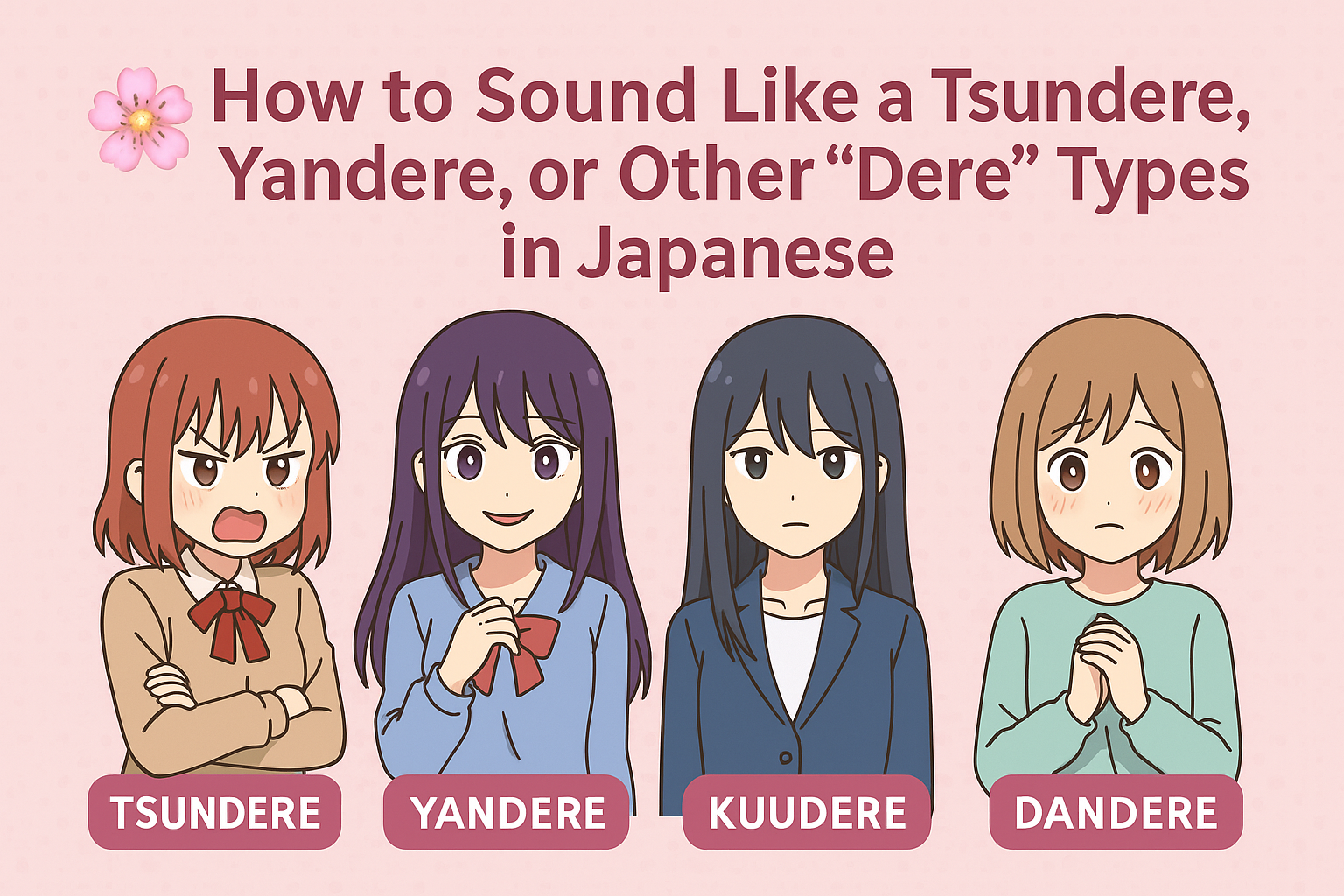
Introduction
Have you ever heard the words tsundere, yandere, kuudere, or dandere in anime circles? These “-dere” types describe popular anime character personalities, and each one has their own way of talking. Want to sound like your favorite “dere” character? Let’s break down what they mean, how they act, and even how they speak Japanese!
アニメには「ツンデレ」「ヤンデレ」「クーデレ」「ダンデレ」など、個性的な“デレ”キャラがたくさん登場します。今回はその特徴や話し方に迫ります!
What Are “Dere” Types?
The “-dere” (デレ) part comes from the Japanese word “deredere”, which means “lovestruck,” “affectionate,” or “flirty.” Anime fans created terms to describe how characters show love—or sometimes, their darker side!
Popular “Dere” Types & How They Speak
-
Tsundere (ツンデレ)
Cold or harsh at first (tsun-tsun), but sweet and loving when alone (dere-dere).
Typical phrases:- 「べ、別にあんたのためじゃないんだから!」
It’s not like I did this for you or anything! B-baka! - 「勘違いしないでよね!」
Don’t get the wrong idea, okay?
- Taiga Aisaka (Toradora!)
- Asuka Langley Soryu (Evangelion)
- Louise Françoise (The Familiar of Zero)
- 「べ、別にあんたのためじゃないんだから!」
-
Yandere (ヤンデレ)
Sweet and loving on the outside, but can become obsessive, possessive, or even dangerous (“yanderu” = mentally ill).
Typical phrases:- 「あなたは私のもの……誰にも渡さない。」
You’re mine… I won’t let anyone have you. - 「ずっと一緒だよ……ね?」
We’ll always be together… right?
- Yuno Gasai (Future Diary)
- Yukako Yamagishi (JoJo’s Bizarre Adventure)
- Satou Matsuzaka (Happy Sugar Life)
- 「あなたは私のもの……誰にも渡さない。」
-
Kuudere (クーデレ)
Cool, quiet, and calm on the outside (“kuu” = cool), but secretly caring and affectionate.
Typical phrases:- 「別に……興味ないけど。」
…It’s not like I care or anything. - 「……ありがとう。」
…Thank you.
- Rei Ayanami (Evangelion)
- Mikasa Ackerman (Attack on Titan)
- Tomori Nao (Charlotte)
- 「別に……興味ないけど。」
-
Dandere (ダンデレ)
Shy, quiet, and introverted (“danmari” = silence), but opens up and becomes very loving with someone they trust.
Typical phrases:- 「……あの、これ、どうぞ。」
Um… Here, this is for you. - 「いっしょにいたいな……」
I… I want to be with you…
- Hinata Hyuga (Naruto)
- Mio Akiyama (K-On!)
- Yuki Nagato (The Melancholy of Haruhi Suzumiya)
- 「……あの、これ、どうぞ。」
Other “Dere” Types You Might Meet
- Himedere (ヒメデレ): Princess-type, wants to be treated like royalty. Example: Erina Nakiri (Food Wars!)
- Bokodere (ボコデレ): Extremely shy, often blushes and stammers.
- Undere (ウンデレ): Always agrees with their loved one, even if they’re wrong!
Sample Dialogue
Taiga (Tsundere): “Don’t get the wrong idea, baka! I just happened to make extra lunch!”
Yuno (Yandere): “We’ll always be together… or else.”
Rei (Kuudere): “…Thank you for your help.”
Hinata (Dandere): “Um… I made you some cookies…”
Fun Facts
- “Tsundere” was first used in dating games and then spread to anime and manga.
- Many characters mix two or more “dere” types!
- “Yandere” memes are super popular among both Japanese and international fans.
- Some “dere” types only exist because of fandom creativity!
What to Watch Out For!
- Don’t copy yandere phrases in real life—people will get scared!
- “Tsundere” teasing is cute in anime, but can be rude if used wrong.
- Real Japanese people don’t usually say “baka!” to friends.
Conclusion
“Dere” types add spice to anime stories and help fans instantly understand a character’s personality. Try spotting these types next time you watch anime—and maybe even try a little “tsun” or “dere” in your Japanese practice (just for fun)!
デレタイプを知れば、アニメのキャラや日本語のセリフがもっと面白くなりますよ!